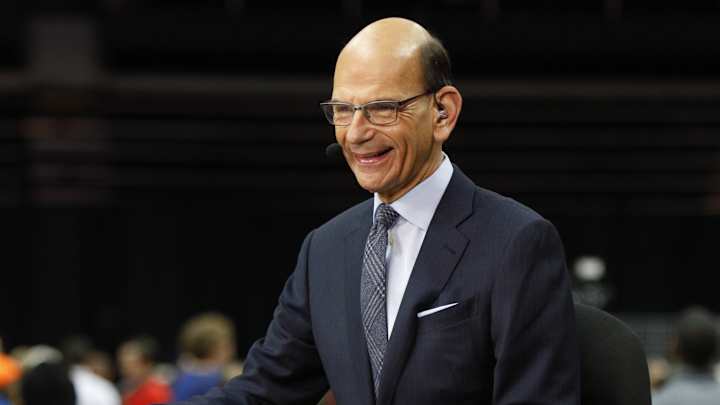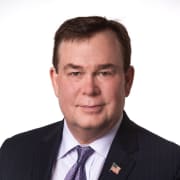Finebaum says the past three weeks have been the biggest challenge of his career

It was March 8, the Sunday before the start of the SEC Men’s basketball tournament in Nashville. Paul Finebaum was working out at home in the Charlotte area and looked down to see an alert on his cell phone.
The first coronavirus case in Tennessee had just been identified in Nashville.
Finebaum was supposed to fly to Nashville on Tuesday as his popular four-hour daily show on the SEC Network was set to go live from Bridgestone Arena.
He mentioned the news to his wife Linda, who is a physician.
“Are you sure you want to go?” she said.
Finebaum discussed it with his producers. Finebaum had had some health issues in January that kept him off the air for four days. Ultimately, Finebaum said, his wife’s “Are you sure you want to go?” turned into “I don’t think you should go.”
So Finebaum was watching from home on Tuesday, March 10, when the Ivy League cancelled its tournament. That same day several other mid-major conferences announced they would play without fans only to cancel later.
“I’m watching this thing minute by minute,” said Finebaum.
The SEC played two opening round games on Wednesday night in Nashville but before the evening was over the SEC had decided that for the rest of the tournament there would be no fans and only essential personnel at the games. But before the first game could be played on Thursday, March 12, the situation grew exponentially worse. The rest of the SEC Tournament and the other college basketball tournaments set for that weekend were also cancelled.
Later in the day the NCAA announced that the men’s and women’s basketball tournaments and all other spring sports championship would be cancelled.
That was three weeks ago today.
Right now, given the loss of life and the way this virus has turned our world upside down, it seems like a million years ago.
But the Finebaum Show, as it has after other tragedies—like Hurricane Katrina in 2005 and the tornadoes of Tuscaloosa in 2011-- has soldiered on, making the transition from a forum to argue about college football to serving as a respite for those who are isolated and those who are scared. Since the SEC Tournament, spring football, and other spring sports went away in mid-March, the Finebaum Show has not missed a day it was scheduled air.
He calls what has happened the past three weeks the biggest professional challenge he has faced as a host.
The past two weeks the show has been on radio only. On Monday Finebaum returned to the SEC Network but with audio only.
“The first week was one of the most difficult we have encountered as a program,” Finebaum said. “At first we had a desire to be as normal as possible. But then there was an underlying tug that we’d better not go that way. This is way too serious.”
Finebaum said that the Friday show after the Thursday, March 12, shutdown was very, very difficult.
“People were just unloading,” said Finebaum. “We were getting a lot of pushback from people who did not want to accept what had happened.”
Finebaum said he got a call from one of his old newspaper bosses who gave him some good advice.
“He told me that you can’t let people politicize this,” he said. “We were dealing with a crisis of unknown proportions.”
So Finebaum and his producers, Mark Kubiak and Daniel Bramlette, have tried to strike the right balance of guests to cover two recurring storylines: 1) How the impact of this virus is impacting the sports world and potentially the 2020 college football season and 2) how the lives of the show’s listeners are being impacted by the virus on a daily basis.
Since there is no Spring practice, coaches have come on to talk about how they are staying in touch with their players on line and getting them ready—physically and academically—when/if football returns.
But the most difficult part of the show now, said Finebaum, has been finding guests to talk about the human side to the devastation:
**--Wall Street Journal Sports Business reporter Michael Smith on the potential financial hardship of huge college athletics departments if there is no college football season. Would sports/staff have to be cut?
**--Psychologist Kevin Elko, who delivers inspirational presentations to Fortune 500 companies and sports teams throughout the United States.
**--Archbishop Joseph Marino, who regularly appears on the show during the Christmas season, appeared on March 23 from Rome, Italy--one of the hardest hit places on Earth--and took calls.
**--Former Astronaut Scott Kelly to talk about isolation. He spent a year on the International Space Station.
But as always, Finebaum’s show is about the callers, who form a community that has been with him since his days as a radio host in Birmingham.
Many of those fans are not in a good place and he understands it. One reason he understands it is because there have been days over the past three weeks that the host, by his own admission, has not been in a good place and showed on the air.
“I had some criticisms for letting my emotions come out. I’ll be honest, I’m scared,” he said. “But you have to be as honest with the audience as humanly possible. I’ve been depressed during the show.
“I have to be authentic with my audience.”
Still, Finebaum said, “I’ve never been more blessed to have this job. It’s a serious responsibility to be out front. I’ve never felt more energized to do what I’m doing.”
Finebaum believes a big part of his job to keep things in perspective. We are in uncharted waters. But he also wants callers to feel free to use the platform as they wish.
“So if they want to talk about Alabama and Georgia playing on Sept. 19 that’s okay,” he said. “Everybody is feeling different things.”
Last week Finebaum had Kirk Herbstreit on the day after the highly-respected ESPN college football analyst said he would be “shocked” if there were 2020 college football season. Herbstreit got significant pushback from portions of the college football community. In a 16-minute interview Herbstreit, the father of four boys (two of whom are on the team at Clemson) said he could not see the games resuming until there was a vaccine to guarantee the player’s safety.
“Herbstreit was honest,” said Finebaum.
Knowing how much college football means to his audience, Finebaum said he is not ready to say whether or not there will be a college football season in 2020.
“People need hope,” said Finebaum.
